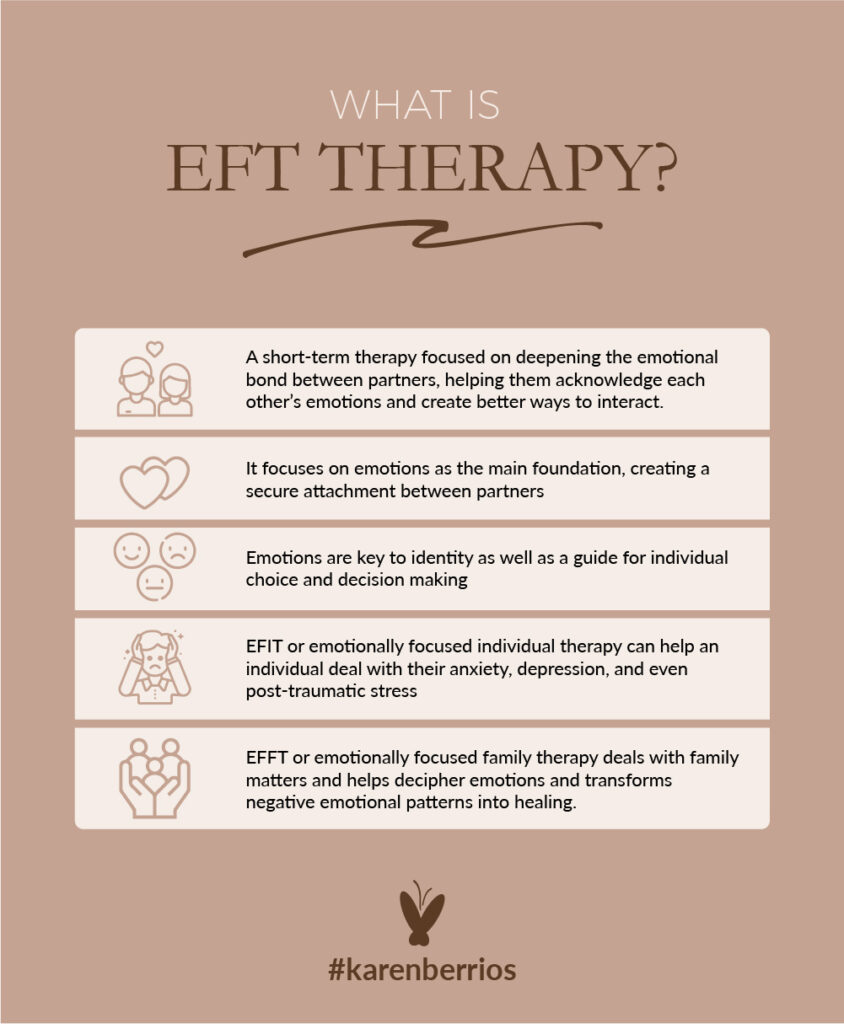

What is EFT Therapy?
EFT Therapy. Also known as emotionally focused therapy, EFT has quickly become one of the most popular approaches to couples therapy. Many therapists even notice an increase in requests for this type of treatment, which leads them to believe how positive experiences of their friends or colleagues made them open to trying it out.
EFT therapy is a form of short-term therapy that focuses on deepening the bond between partners and improving their emotional attachment. Unlike many other forms of therapy where the focus is on the couple’s arguments and fights, the goal of emotionally focused therapy is to create a more secure emotional bond. This can, consequently, result in a much stronger relationship and improved communication.
Created and developed by dr. Sue Johnson and Les Greenberg in the 1980s, EFT therapy changed the field of couples therapy, basing it on the premise that emotions are key to identity as well as a guide for individual choice and decision making. In other words, lacking emotional awareness or ignoring positive and negative emotions in adult relationships can cause more problems down the road, potentially creating an even deeper discrepancy between couples.
In addition to EFT for couples therapy, this approach can also be used to address individual anxiety, depression, and even post-traumatic stress. This is known as Emotionally Focused Individual Therapy or EFIT. Lastly, it can also work as a means to repair family bonds – Emotionally Focused Family Therapy or EFFT.
Therapists who are qualified and certified in emotionally focused therapy work very closely with the client or clients, focusing on bringing more awareness to their emotions and emotional responses, allowing them to fully experience each emotion and learn how to dissolve negative patterns by forming positive ones.
One of the most important ways in which an emotionally focused therapist differs from others is that through this approach, he or she collaborates with the clients in an active process, as they are the only ones who can fully interpret the whole scope of their emotions. The therapist’s goal is to guide them on how to interpret them and to learn how to value their importance in human behavior.
EFT Therapy Techniques
Emotionally focused therapy is outlined in a clearly defined system consisting of three stages and nine specific steps. This helps guide the entire healing process, helping both, the therapist and the couple (or an individual) to track progress and notice changes. The key is to acknowledge and accept each other’s emotions, create a non-judgemental emotional response to emotional distress, learn how to transform these emotions, and use the knowledge to avoid negative or harmful behaviors.
- De-Escalation
This stage is meant to identify negative emotions, emotional patterns, and interactions that might lead to conflict, helping them re-frame them and see them from different perspectives. It helps the couples see what’s the main driver behind these emotions and whether or not they’re caused by fear, insecurities, or something else.
When experiencing negative emotions, people have a tendency to act completely differently from one another. Some may have a pattern of “shutting down,” while others want to get into a conflict and verbally express their unhappiness with the situation. Whatever the case may be, this stage of EFT therapy helps them see why each person acts the way they do, helping them with emotion regulation and teaching them to be more emotionally available and open to one another, securing and strengthening their attachment bond.
- Restructuring
The second stage of EFT therapy focuses on teaching the couple how to express their emotions to one another with increased empathy, compassion, and acceptance. Unpleasant emotions become easier to interpret if the other person is more open and non-judgemental about receiving them. This creates a more secure emotional bond in intimate relationships, helping them resolve their issues through mutual understanding, love, and becoming more responsive to each other’s needs.
- Consolidation
The final step helps the couple develop new communication skills and strategies that are meant to prevent conflict and change the way their emotions influence their interaction. These new sequences and constructive strategies replace old patterns, creating a growing and healing environment for both partners.
Communication and properly dealing with negative emotions can completely change the way a couple interacts, up to the point of resolving many of their long-standing problems and unacknowledged emotions.
EFT therapy sessions usually consist of 8-20 visits, following this structured approach, giving each couple enough time and freedom to take it at their own pace, listening to their own emotions, and allowing their emotional growth to showcase in each stage of the healing process. Being defined as emotionally focused therapy, every EFT therapist allows each person to experience it through their own therapy process to be able to acknowledge their partner’s emotional experience and patterns.
Studies show the significance of secure attachment between partners and their mental health, with proof of their brains reading them as “safety”. The more secure our bonds are, the safer and calm we feel, preventing conflict and negative emotional responses.

Emotionally Focused Individual Therapy or EFIT
EFIT is an attachment science-based approach to individual therapy that focuses on developing a greater awareness around one’s emotions and reshaping patterns of engagement with themselves and others they interact with, no matter their type of relationship. It allows for a transformative experience where the client learns how to deal with their emotions to help them deal with existential life issues and create secure attachments with others.
This approach shows great results in people struggling with depression, anxiety, and post-traumatic stress as it helps them analyze their negative patterns and emotional experience attached to it, reshaping it and restructuring it from the ground up.
Emotionally Focused Family Therapy or EFFT
Family therapy is complicated in more ways than one, and using this approach can help stabilize a family’s negative interaction pattern, restructure parent-child interactions and emotional responses, and consolidate a secure attachment and a safe environment by forming new communication and dealing strategies.
This approach values the emotional experience of every person in the family, helping them create a deeper understanding and empathy, potentially preventing conflict and restructuring their negative interactions with one another. It’s a groundbreaking experiential therapy, creating special attachment sequences between family members.
Final Thoughts
Emotionally focused therapy or EFT is a humanistic approach to couples therapy, but its principles well exceed just intimate relationships. They can be of great help for individuals as well as entire families as they dive deeper into their emotions, get a better understanding and acceptance, as well as work on constructing new ways to communicate and interact with each other.

hey there
I'm Karen!
I have found my cancer journey to be a positive and profound transformational experience. I’m inspired to share my healing journey here, and trust you’ll find hope, encouragement and purpose as you discover the healing power that lies within you.
Join
The Mailing List!
By signing up for my newsletter, you agree with our Privacy Policy and Terms & Conditions.


